Protecting consumers during the coronavirus (COVID-19) pandemic: update on the work of the CMA
Published 15 March 2021
1. Background
The Competition and Markets Authority (CMA) works to protect consumers and ensure that businesses operate within the law.
In March 2020, the CMA launched a programme of work to identify, monitor and respond to competition and consumer problems arising from coronavirus and the measures taken to contain it. Since then, regular updates and information have been published on the CMA coronavirus (COVID-19) response pages on GOV.UK.
This report summarises the key consumer issues that have come to the attention of the CMA during the pandemic to date, and the work it has been carrying out in response.
In line with the CMA’s Draft Annual Plan for 2021/22, the protection of consumers during the pandemic will remain an organisational priority in the year ahead. We will take forward the investigations we have launched (see below); we will monitor complaints and other sources of intelligence to understand new and emerging consumer issues; and we will take further action where appropriate.
2. Overview
Over the last year, the vast majority of businesses have acted responsibly and fairly in the unprecedented circumstances created by the coronavirus outbreak[footnote 1]. But a small minority have not treated their customers fairly. The CMA has used a number of sources to track and assess the scale and nature of these problems, including:
-
monitoring and analysis of complaints received, both through email and its online form. From 10 March 2020 to 28 February 2021, the CMA has been contacted 148,000 times about coronavirus-related issues (a portion of which fall outside the CMA’s remit). The rate at which consumers contacted the CMA in recent months (5,000 in February 2021) has fallen back from levels seen earlier in the pandemic (around 30,000 at the peak in May 2020). Section 3 contains an analysis of these complaints.
-
information received from consumer bodies, such as Which? and Citizens Advice; through enforcement partners such as Trading Standards; through sector regulators; and through electronic point of sale data.
Currently, the most significant COVID-19-related consumer problem remains unfair practices in relation to cancellations and refunds. Consumers have complained about firms refusing to provide refunds; introducing unnecessary complexity into the process of obtaining refunds; charging high administration or cancellation fees; and automatically sending consumers vouchers instead of cash refunds, without explaining that vouchers could be redeemable for cash at any time.
In response, the CMA has launched investigations in a number of sectors, including package holidays, air travel, holiday lets and weddings. Its action has ensured that hundreds of millions of pounds have been refunded to consumers.
The CMA has also published its views on how the law applies – both generally and in specific sectors – to help businesses treat their customers fairly and to help consumers understand their rights. In most cases, the CMA would expect consumers to be offered a full refund where no service is provided (our public statements explain where there are exceptions to full refunds), including where a consumer cancels because they are prevented from receiving any services as a result of coronavirus-related legal restrictions on travel or business activity.
Further information about the CMA’s action to uphold consumers’ cancellation rights can be found in Section 4.
Early on in the pandemic, the CMA also received a high volume of complaints about unfair high prices being charged for certain goods, including hand sanitiser and essential food items. The CMA took a number of steps to prevent and address such practices, which are also described in Section 4.
The volume of price-related complaints declined from early April 2020 and it remains at low levels: fewer than 100 in February 2021, compared with over 16,000 in March 2020 across all channels.[footnote 2]The most recent national lockdowns had no impact on the volume of complaints about high prices. Although the CMA judges that the problem is no longer widespread, we remain alert to the possible re-emergence of exceptional circumstances that would enable unjustifiably high prices to be sustained again. We continue to monitor complaints about unfair prices; and where there is evidence that businesses have breached competition or consumer protection law, the CMA will take enforcement action if warranted.
3. Complaints analysis
The CMA has been contacted 148,000 times about coronavirus-related issues via emails and the CMA’s online form from 10 March 2020 to 28 February 2021. This section provides an analysis of the 139,000 submissions received via the form up to and including 28 February 2021.[footnote 3]
Number of submissions
The chart below shows the number of submissions made to the CMA’s online form since its launch on 20 March 2020. Changes over time should be interpreted cautiously because they can be driven by the CMA’s public statements, news coverage and organised campaigns.
The average from April 2020 to February 2021 is around 12,000 submissions a month, with a peak of 30,000 submission in May 2020 which follows the announcement of our programme of work to investigate businesses failing to respect cancellation rights.[footnote 4]The May peak is followed by a steady decline to 5,000 submissions in December 2020. Submissions increased in January 2021 to 8,000, coinciding with the start of the third national lockdown, before falling again to 5,000 in February.
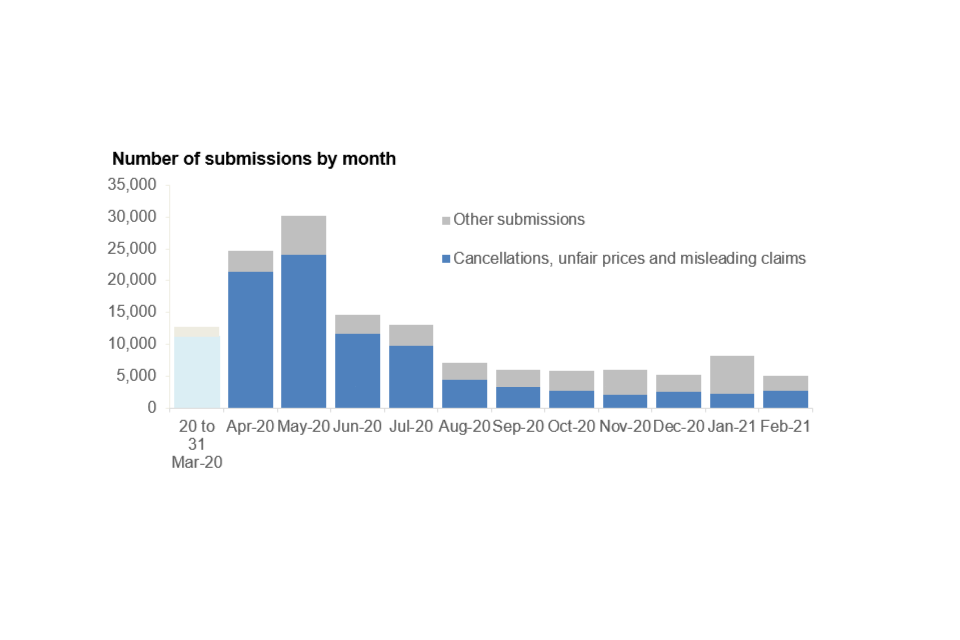
Number of submissions by month
Source: CMA complaints data.
Note: The first column only covers 12 days starting on 20 March 2020
For a description of what this chart shows, see the chart descriptions section
The 139,000 submissions in the chart above include 40,000 submissions concerning ‘other’ matters that users wished to report: these are shown as grey bars.[footnote 5] These submissions are reviewed on the same basis as the other complaints, to assess whether further action is required. However, only a small minority of these submissions falls within the CMA’s remit. Instead, the most frequently-raised concerns in this category relate to business compliance with COVID-19 guidelines and rules on employee furlough and safety (e.g. PPE, social distancing and isolating employees after positive tests), not enforcing rules on customers (e.g. track and trace check-ins, mask wearing) and staying open when the business should close.
These are important matters that we are communicating to the relevant organisations. But since complaints in this category relate predominantly to issues that fall outside the CMA’s remit, they are excluded from the rest of the analysis in this section.
Number of businesses reported
The chart below shows the number of new businesses reported to us by month.[footnote 6]
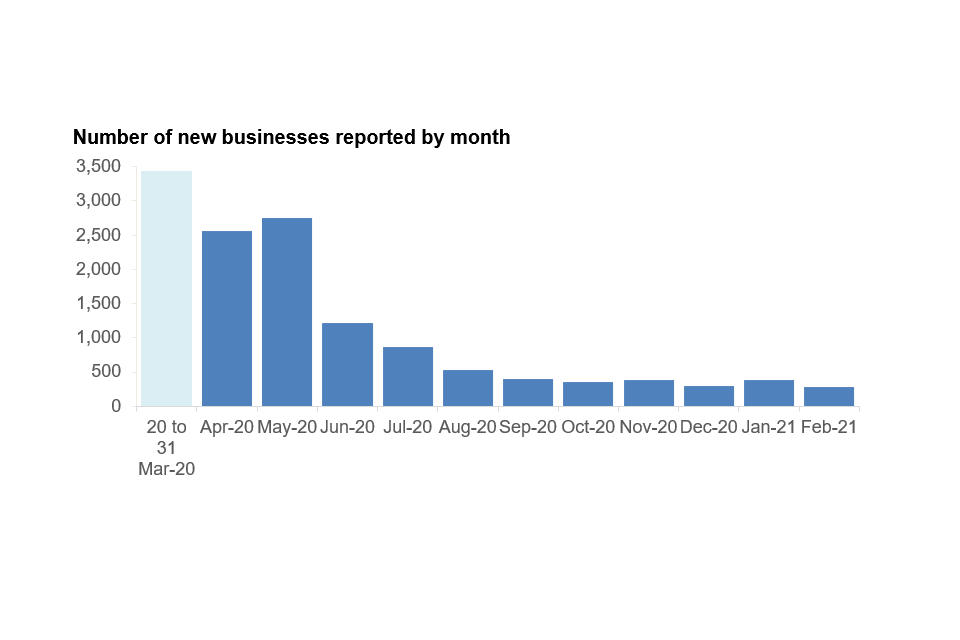
Number of new businesses reported by month
Source: CMA complaints data covering cancellations, unfair prices and misleading claims.
Note: This chart relies on matching business names reported by different complainants; it should be regarded as a good approximation, rather than an exact reflection, of the number of individual businesses complained about.
For a description of what this chart shows, see the chart descriptions section
The number is highest in March 2020 with 3,400 new businesses reported in the first 12 days of the form going live. The number of new businesses has dropped sharply since – a trend driven by falling complaints coupled with ongoing complaints about the same businesses. The latest figure for February 2021 is under 300.
In total, there are a little over 13,000 businesses in this chart. This is a very small minority of the more than 5.9 million private sector businesses in the UK – fewer than three in a thousand.[footnote 7]
The difference between the number of complaints about cancellations, prices and misleading claims and the number of businesses is due to a small group of large companies each attracting hundreds or thousands of complaints. Taken together, the ten most complained about companies account for a third of complaints. By contrast, most businesses have only been reported to us once.
The vast majority of complaints about the ‘top-ten’ companies relate to issues around cancellations and refunds. Nine out of the ten companies supply services, all of which are to do with travel, holidays and accommodation. Only one of the top ten sells goods.
Types of submission
Almost all submissions received by the CMA in March related to price rises, particularly for personal hygiene goods such as hand sanitiser and basic food products. We received 10,500 price complaints in March 2020, but numbers dropped sharply thereafter, to 3,000 in April and falling below 100 after August 2020.
On the other hand, the number of submissions about cancellations and refunds started low in March but grew very fast in April. Cancellation complaints overtook price complaints on 9 April, and have since then accounted for the overwhelming majority of complaints. After a peak of 22,500 complaints in May, volumes dropped steadily and have fluctuated around 2,000 complaints a month since October 2020.
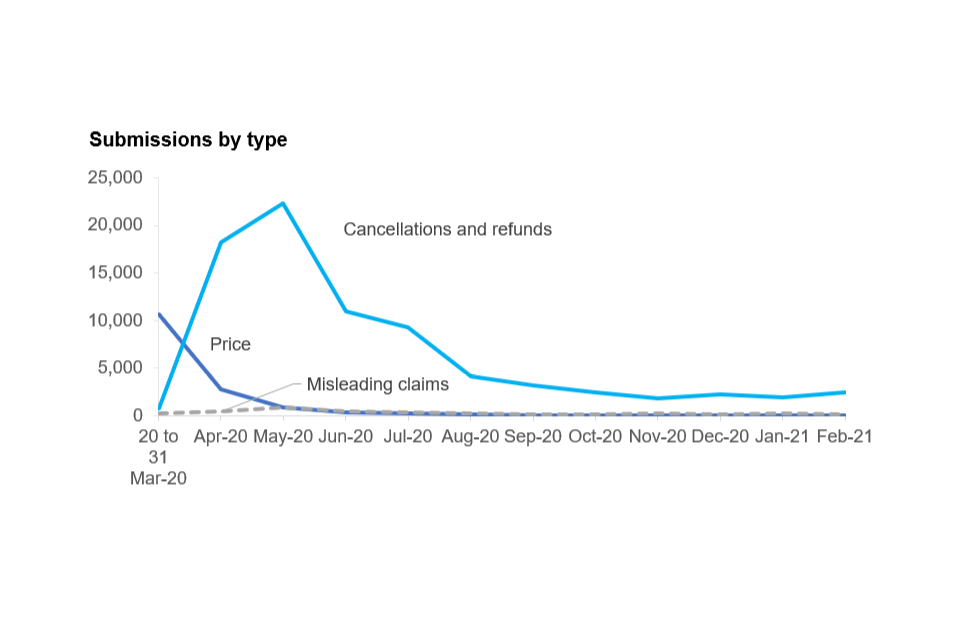
Submissions by type
Source: CMA complaints data.
Note: Complaint type is selected by complainants and may include some misclassification.
For a description of what this chart shows, see the chart descriptions section
Submissions about misleading claims – for instance about the efficacy of personal protective equipment – have remained low, hovering between 100-400 a month except for a peak of 800 in May 2020.
The chart below shows the most complained-about sectors and product categories within cancellation and price submissions. The food and drink category has received the most price complaints – 7,000 since 20 March 2020 – but holiday-related complaints about cancellations and refunds have attracted nearly seven times as many complaints – 47,000.

Number of complaints by cancellation sector and by product category
Source: CMA complaints data.
Note: 20 March 2020 to 28 February 2021; Holidays covers packages, accommodation (lets and caravan parks), hotels, travel agents and booking sites.
For a description of what this chart shows, see the chart descriptions section
Cancellations and refunds
The chart below shows the number of cancellation and refund complaints received since 20 March 2020, broken down between holidays, airlines and other. Complaints related to holidays (accommodation, hotels, travel agents, booking sites and package holidays) account for well over half of all cancellation complaints. Within the holidays category, around half of complaints are about package holiday providers, and a quarter are about holiday accommodation. Outside of holidays, airlines account for around 16% of all cancellation complaints, followed by goods at 6%.
The sharp increase in complaints about airlines in April 2020 might reflect campaigns at the time by consumer organisations and other groups about the approach to refunds by a number of major airlines, while the May peak for other sectors follows the announcement of our programme of work to investigate businesses failing to respect cancellation rights.[footnote 8] Since then, complaints have fallen to relatively low levels across all sectors: from 13,500 in May 2020 to 1,700 in February 2021 for holidays; from around 6,500 at the peak to 500 and 300 in February 2021 for other sectors and airlines respectively.
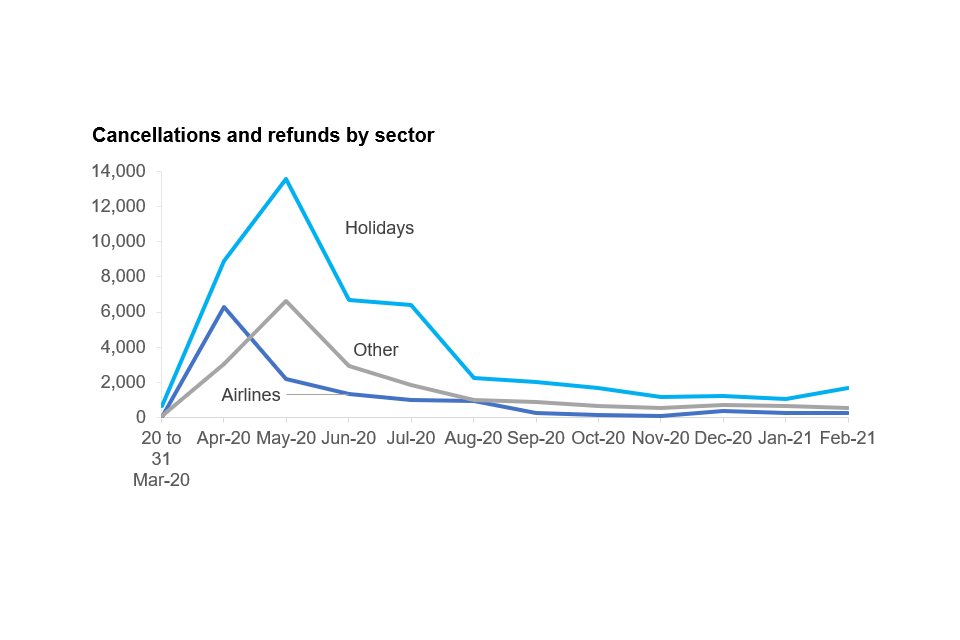
cancellations by sector
Source: CMA complaints data
For a description of what this chart shows, see the chart descriptions section
Sectors differ not only in the number of complaints they attract, but also with respect to the amounts at stake for consumers. Across all cancellation complaints, the average (median) amount at stake is around £800. At the lower end, the median amount at stake for events and goods is around £200. At the top end is weddings which account for fewer complaints (around 2,400), but involve much larger sums (an average of £6,500 at stake). The holiday sector has both high volume (well over half of all cancellation complaints) and high amounts at stake (average of £1,000).

cancellations amounts at stake Average reported amount for all and selected sectors
Source: CMA complaints data.
Note: This chart relies on extracting the amounts at stake as described by complainants in free text, where an amount has been reported. It should be regarded as a good approximation, rather than an exact reflection, of the true value; methodological improvements may lead to revisions.
For a description of what this chart shows, see the chart descriptions section
Price increases
The chart below shows a breakdown of price increase complaints by product category. Food and drink is the largest category, accounting for 40% of all price complaints, followed by hygiene and personal care and all other price complaints, both at around 30%. Volumes across all categories drop sharply between March and June 2020, and remain low thereafter. Overall, the most complained about product is meat (e.g. chicken, lamb, halal meat, poultry), followed by hand sanitiser, toilet paper, rice and vegetables.
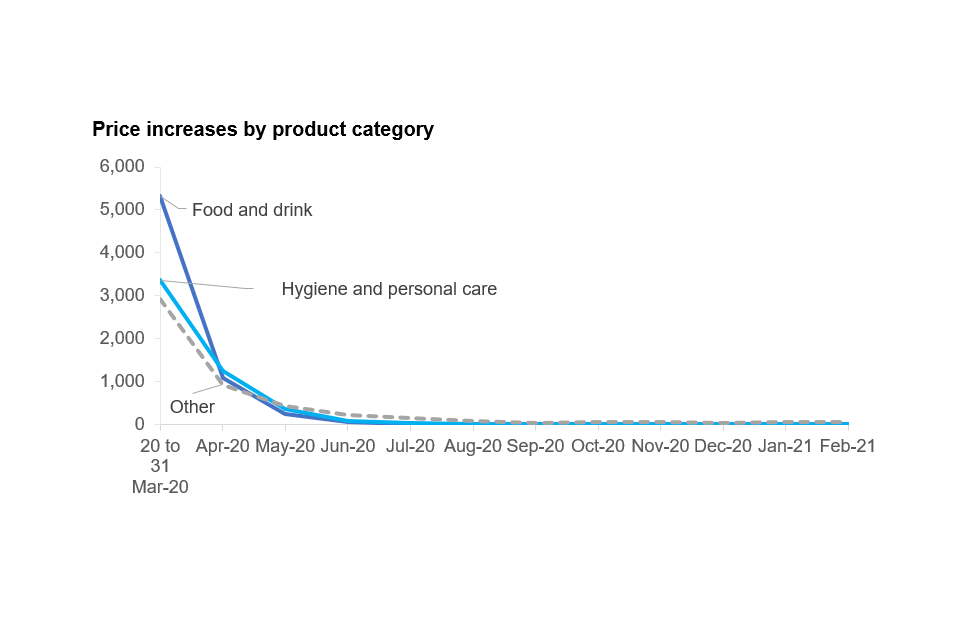
Price increases by product category
Source: CMA complaints data.
For a description of what this chart shows, see the chart descriptions section
In our last report in July 2020, we analysed transaction data collected by Nielsen and showed how prices for essential items were broadly returning towards normal levels by mid-May 2020. Based on our own subsequent data and intelligence, we have not identified any remaining, sustained instances of unjustifiable price increases. We remain alert to the possible re-emergence of exceptional circumstances that would allow egregious pricing practices to be sustained again, and remain ready to intervene should that happen.
Stakeholders
The CMA works closely with other enforcers (in particular Trading Standards Services (TSS)), consumer organisations and overseas authorities. Many of these are also collecting data about COVID-19-related consumer concerns.
Information shared by other enforcers (notably TSS) and consumer organisations (including Which? and Citizens Advice) broadly reflects the analysis set out above: in particular, cancellations and refunds overtaking price rises as the most common cause of complaint, with holidays, travel, weddings and events among the most complained-about sectors.
Information shared by overseas consumer protection and enforcement authorities is also broadly consistent with this picture. Many have reported problems with price rises and businesses refusing to pay refunds to consumers, particularly in the travel sector, and they are using their own laws to try to tackle these issues.
4. Tackling harmful practices
The CMA has a range of options at its disposal to tackle harmful practices. It can seek further information from businesses; it can issue them with advisory or warning letters; it can work with enforcement partners, consumer bodies and trade associations; where appropriate, it can take enforcement action under its competition and consumer protection law powers; and it can advise government, including on emergency legislative changes that could improve competition and consumer outcomes.
The CMA’s decision to investigate a sector, and the action it takes, can depend on a number of factors. These include the number of complaints it receives, both directly and through stakeholders and enforcement partners; the nature of practices being complained about; the scale of potential consumer harm; and whether other regulators and consumer law enforcement bodies are better placed to respond. The CMA’s Prioritisation principles describe in more detail the factors it takes into account when deciding on new projects and programmes of work.
The remainder of this section sets out the CMA’s response to the two principal concerns that have come to light since March 2020: problems with refunds and cancellations, and unjustifiable price rises.
Cancellations and refunds
As set out above, the large majority of the complaints received by the CMA relates to difficulties securing refunds following cancellation. As set out below, the CMA has responded through the provision of general guidance to consumers and businesses, and with action and guidance in respect of specific sectors.
General guidance to businesses and consumers
To help consumers understand their rights and to help businesses treat their customers fairly, the CMA – working closely with other consumer law enforcement partners – set out its general views on how the law operates in respect of cancellations and refunds in a statement last updated on 28 August 2020. The statement covers a range of consumer contracts and different situations and sets out that in most cases the CMA would expect a full refund to be offered to consumers if:
- a business has cancelled a contract without providing any of the promised goods or services;
- no service is provided by a business, because this is prevented by legal restrictions, such as those that apply during the lockdown announced on 4 January; or
- a consumer is prevented from receiving any goods or services, because, for example, lockdown laws in the UK or abroad have made it illegal to receive or use the goods or services.
With many people spending more time at home and online, the CMA has also worked with the Advertising Standards Authority to provide guidance to consumers on avoiding unwanted and unexpected charges when signing up to ‘free’ trials.
Action in specific sectors
Weddings and private events
Practices of concern include venues refusing to refund any money and telling people to claim on their insurance; deductions from refunds that exceed directly-incurred costs; delays to refunds; misleading customers about the level of refund to which they are entitled; and additional charges for rescheduling. Following engagement with the weddings sector, the CMA has:
-
Published an Open letter to the weddings sector and a statement of our position on cancellation and refunds, setting out the CMA’s views on how the law operates in relation to weddings which have been or will be affected by coronavirus restrictions. (September 2020)
-
Taken action in respect of Bijou Weddings Group, which resulted in an agreement that fairer refunds would be offered to customers whose weddings were cancelled because of COVID-19 restrictions. (September 2020)
-
Written directly to a number of providers that continued to be the subject of complaints, asking them to review their practices to ensure they comply with the law, or risk enforcement action. (November 2020)
Package holidays
Practices of concern include refusing refunds; making it very difficult for consumers to obtain refunds; significant delays in providing refunds legally owed to customers; and automatically sending vouchers without a clear explanation that they can be exchanged for cash at any time, and that a refund is automatically due upon expiry.
In response to the various concerns that have been raised, the CMA has:
-
Written an open letter to package holiday businesses, reminding them of their obligations under consumer law, including the obligation to provide a prompt and full refund when holidays were cancelled by the company as a result of coronavirus restrictions. The letter was also sent directly to the 100 package holiday businesses that had been the subject of the largest number of complaints to the CMA. (July 2020)
-
Secured formal commitments from a number of major package holiday providers (LoveHolidays, Lastminute.com, Virgin Holidays, TUI UK) to provide refunds without undue delay to customers whose holidays were cancelled as a result of coronavirus restrictions (October-December 2020). These firms have refunded or committed to refund customers more than £200m. The CMA has acted robustly to ensure these commitments are upheld. For example, following a warning from the CMA in February 2021 that it planned to take court action, Lastminute.com has now paid back a further £1 million in outstanding refunds to thousands of customers, in line with its commitments.
-
Launched an investigation into Teletext Holidays, which has been the subject of hundreds of complaints about refunds for cancelled package holidays. The CMA is currently gathering further evidence on whether the company has broken consumer protection law. (February 2021)
Holiday lets
Practices of concern included refusing to provide cash refunds. The CMA has secured formal commitments from two major holiday lets companies – Vacation Rentals (June 2020) and Sykes Cottages (July 2020) – to offer full refunds to customers who booked holiday homes but could not stay in them as a result of coronavirus restrictions. These two companies collectively accounted for a majority of all complaints received about holiday lets. The CMA’s action has resulted in £45m in refunds being paid out to eligible customers.
Nurseries and childcare provision
Practices of concern included continuing to charge high fees while nurseries were closed; and asking people to pay high sums to keep a place open for their child (“retainer fees”). In response, the CMA has:
-
Published an open letter to the sector explaining the requirements of consumer law, and asking them to consider their contracts and arrangements with customers to ensure they are compliant. (July 2020)
-
Issued advice to assist nursery and early years providers in reaching fair agreements with parents. (July 2020)
Airlines
Practices of concern include airlines failing to offer cash refunds to consumers for flights they could not lawfully take as a result of coronavirus travel restrictions. In response, the CMA has:
-
Worked closely with the Civil Aviation Authority, which leads on consumer protection in the airlines sector and shares the same enforcement powers to tackle breaches of consumer protection law.[footnote 9]
-
Opened an investigation (December 2020) into whether airlines have breached consumers’ legal rights by failing to offer cash refunds for flights they could not lawfully take (for example during the second lockdown in England in November).
Further advice on Higher Education
The CMA has not opened an investigation into this sector. But in response to requests from some stakeholders, in November 2020, the CMA has restated the views it first published in 2015 about how consumer law applies in the HE undergraduate sector. The restatement covered:
-
the provision of information to prospective students about potential changes to the courses they may be considering applying for;
-
the use of terms which allow HE providers a wide discretion to vary aspects of the educational service; and
-
the use of terms which exclude or limit liability for a failure to deliver the agreed educational service or for delivering a different educational service
Unjustifiable price rises
The CMA responded to complaints about unjustifiable price rises in the following ways.
-
Investigations under the Competition Act. On 18 June 2020, the CMA launched investigations into suspected breaches of competition law by four pharmacies and convenience stores. The investigations related to suspected charging of excessive and unfair prices for hand sanitiser. The focus on hand sanitiser in these investigations reflects the prevalence of complaints and the magnitude of reported price increases for this product. These investigations have since been closed.
-
Direct engagement with businesses where we had concerns. Between March and July 2020, we wrote to over 350 businesses asking for more information or expressing concern about unjustifiable price rises. Together, these businesses account for over 5,600 complaints. Many of these businesses subsequently reduced the prices they were charging.
-
Working with trade associations, regulators and other bodies. Between March and July 2020, the CMA worked with others to clarify expectations of businesses and warn about the potential consequences of charging unjustifiably high prices. This included, for instance, joint statements with trade associations in the retail, wholesale and pharmacy sectors.
-
Engagement with online retail platforms. Many complaints about unjustifiable price rises related to listings placed on online platforms. We wrote to Amazon and eBay in March 2020, and over the subsequent months continued to draw to their attention complaints about listings charging unjustifiable prices for essential goods.
More information
Further details about the CMA’s response to concerns about unjustifiable price rises can be found in the update on its work published on 3 July 2020.
All the CMA’s coronavirus-related announcements and publications can be found in this collection: CMA coronavirus (COVID-19) response.
Chart descriptions
Number of submissions by month
This chart shows the number of submissions made to the CMA’s online form since its launch on 20 March. The average from April 2020 to February 2021 is around 12,000 submissions a month, with a peak of 30,000 submission in May 2020. The May peak is followed by a steady decline to 5,000 submissions in December 2020. Submissions increased in January 2021 to 8,000, before falling again to 5,000 in February.
The chart divides submissions between those about cancellations, unfair prices and misleading claims and those concerning ‘other’ matters that users wished to report. The ‘other’ submissions are a minority of the total until October 2020, when they become and remain the majority until February 2021.
Number of businesses reported by month
This chart shows the number of new businesses reported to us by month. The number is highest in March 2020 with 3,400 new businesses reported in the first 12 days of the form going live. It is around 2,600 and 2,700 in April and May 2020. The number of new businesses drops sharply after that. The latest figure for February 2021 is under 300.
Submission by type
This chart shows submissions by type. Almost all submissions in March 2020 relate to price rises, of which there were around 10,500. The number of price submissions drops sharply thereafter, to 3,000 in April and falling below 100 after August 2020.
On the other hand, the number of submissions about cancellations and refunds starts low in March 2020 but grows very fast in April. Cancellation complaints overtake price complaints on 9 April 2020, and account for the overwhelming majority of submissions after that. They peak at 22,500 submissions in May 2020, and drop steadily thereafter. They fluctuate at around 2,000 submissions a month from October 2020 onwards.
Submissions about misleading claims remain low throughout, hovering between 100-400 a month except for a peak of 800 in May 2020.
Number of complaints by cancellation sector and by product category
This chart shows the most complained-about sectors and product categories within cancellation and price submissions. On the cancellation side, there are around 47,000 holiday-related complaints, 13,000 airline complaints and 4,500 goods complaints. On the price side, there are around 7,000 food and drink complaints, 5,000 hygiene and personal care complaints and 1,000 medication complaints.
Cancellations and refunds by sector
This chart shows the number of cancellation and refund complaints received since 20 March 2020, broken down between holidays, airlines and other. Complaints related to holidays (accommodation, hotels, travel agents, booking sites and package holidays) account for the bulk of complaints.
Complaints about airlines peak in April 2020 and fall thereafter. Holidays and other complaints peak in May 2020 and also fall thereafter. Past the peaks, complaints fall to relatively low levels across all sectors: from 13,500 in May 2020 to 1,700 in February 2021 for holidays; from around 6,500 at the peak to 500 and 300 in February 2021 for other sectors and airlines respectively.
Cancellations: amounts at stake average (median) reported amount for all and selected sectors
This chart shows the amounts at stake for consumers in cancellation complaints, broken down by sector. Across all cancellation complaints, the average (median) amount at stake is around £800. At the lower end, the median amount at stake for events and goods is around £200, followed by airlines at around £600, holidays at around £1,000, and weddings at the top with an average of £6,500 at stake.
Price increases by product category
This chart shows a breakdown of price increase complaints by product category. Food and drink is the largest category, followed by hygiene and personal care and all other price complaints at similar levels. Volumes across all categories are highest in March 2020: around 5,300 for food and drink, 3,400 for hygiene and personal care, and 2,900 for all other price complaints. Complaints drop sharply between March and June 2020, and remain below 100 for all categories from August 2020 onwards.
-
The CMA has received consumer-related complaints via its online form relating to a little over 13,000 individual businesses, fewer than three in a thousand of the total number of private sector businesses operating in the UK. ↩
-
Email and online form, as explained below. ↩
-
We define a ‘contact’ as a person getting in touch with us, whether via email or the online form. Each form submitted online is a ‘submission’. A contact, whether by email or form, can contain zero, one or more than one complaint (for example, a person may be complaining about several products, or none). ↩
-
COVID-19: CMA to investigate cancellation policy concerns (press release), 30 April 2020. ↩
-
The categories users can select are: problems with the cancellation, refund or exchange of products or services, unfair prices for products or services I’m buying for me and/or other people, unfair prices for business-to-business sales, a business making misleading claims about products or services and other unfair behaviour ↩
-
The chart excludes businesses reported in ‘other’ submissions, as explained above. ↩
-
BEIS, Business Population Estimates, 2019, Table 1. ↩
-
COVID-19: CMA to investigate cancellation policy concerns (press release), 30 April 2020. ↩
-
The CAA has announced that it is reviewing how airlines are handling refunds during the coronavirus pandemic. An update to this work was published on 1 July. The CAA has also published guidance and advice on refunds for industry and consumers. ↩

